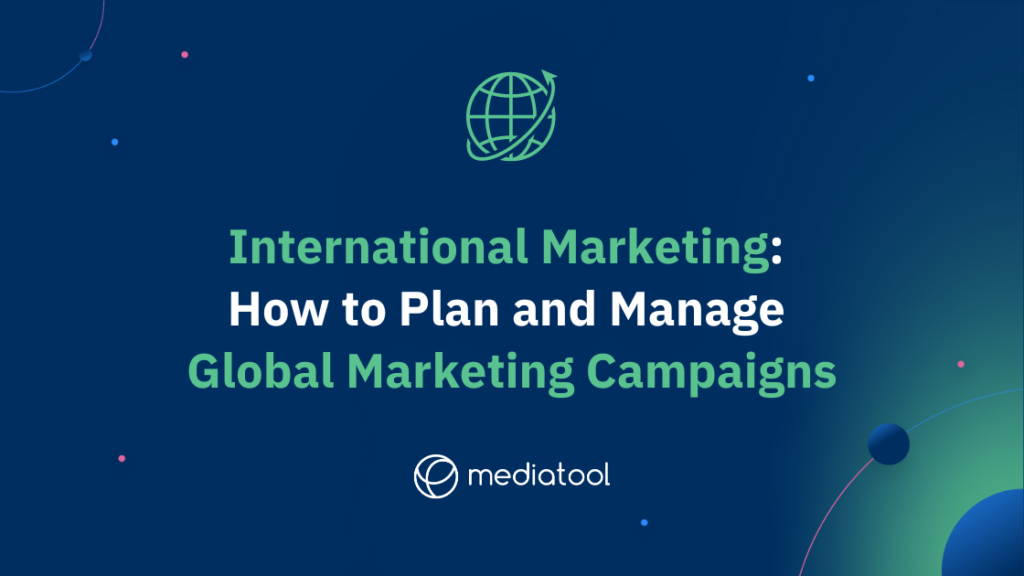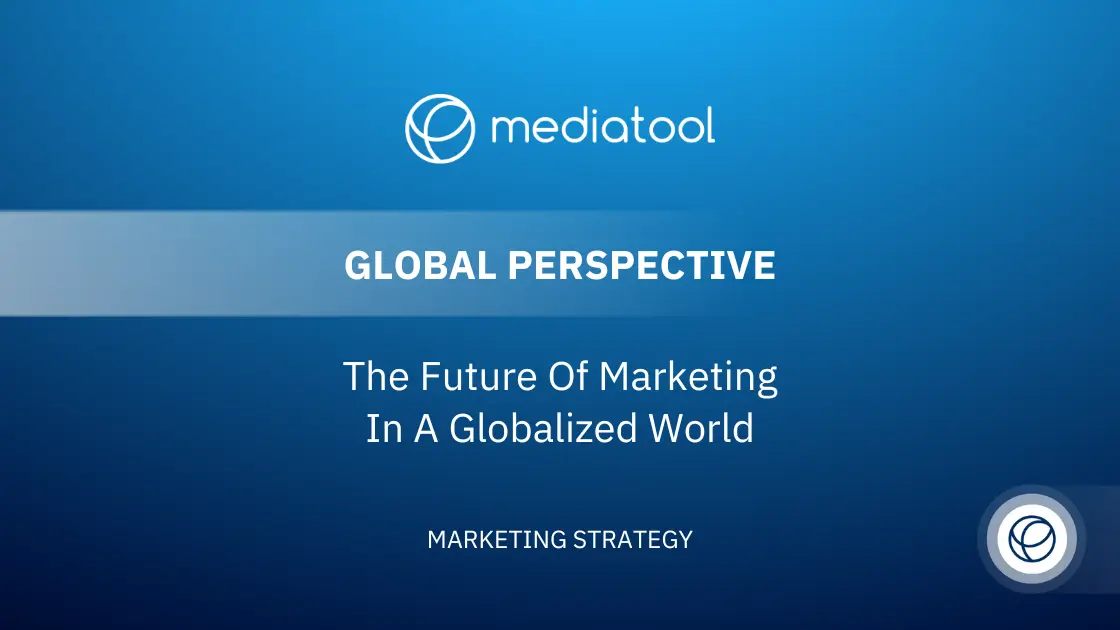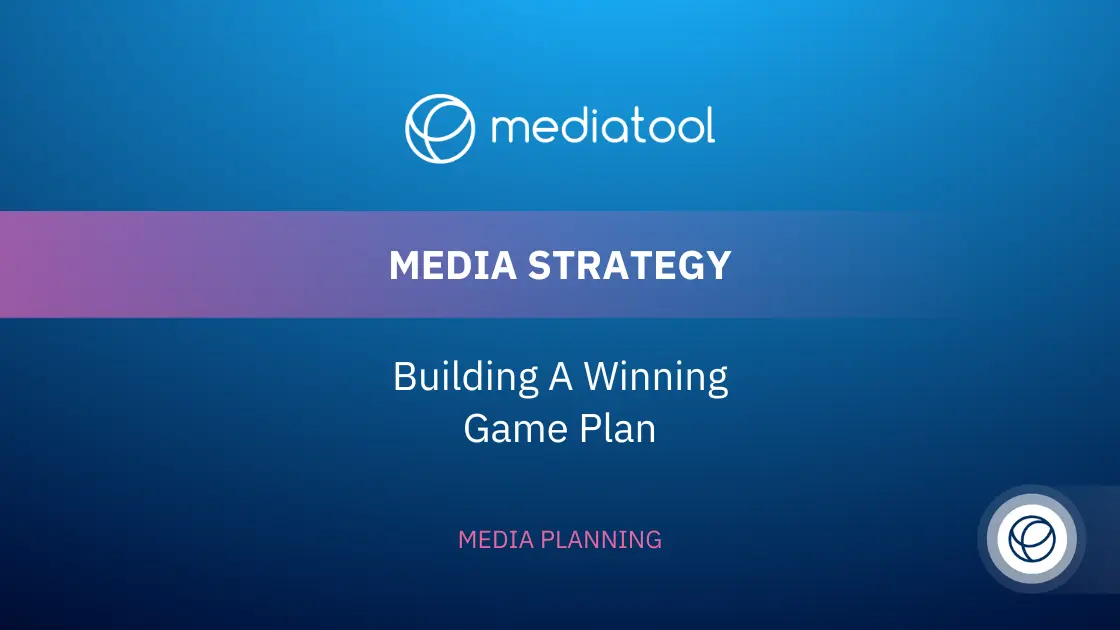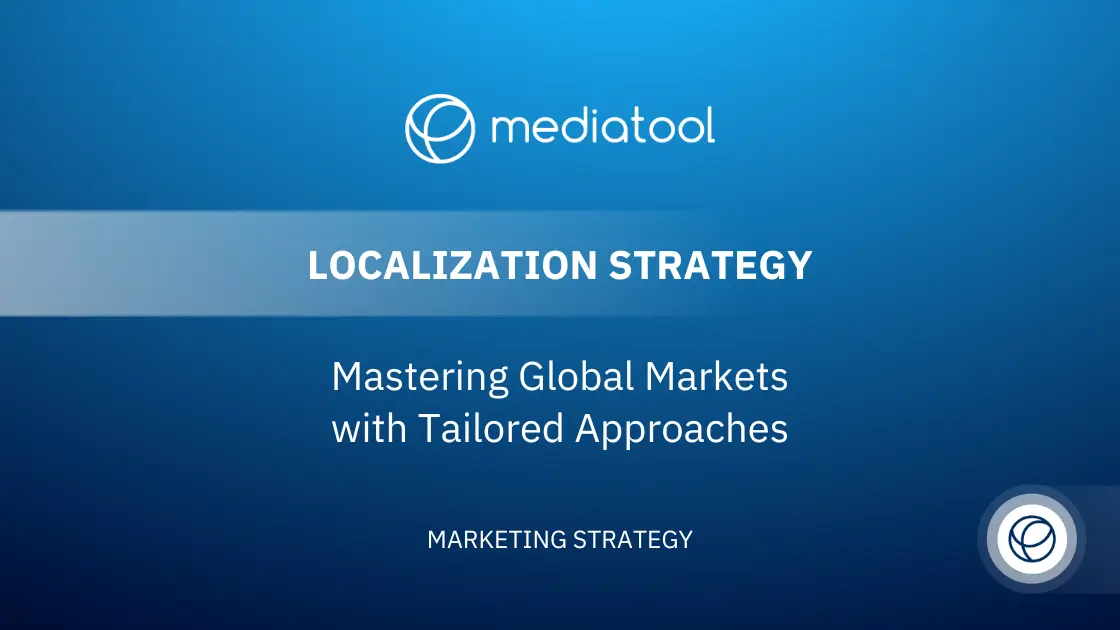Going global is the ultimate goal for every large enterprise. The chance to expand your business and engage in international marketing, selling products to customers around the world, is also an opportunity to grow your revenue, bolster your brand, and solidify your company as a major player in its industry for years to come.
But it’s one thing to design and successfully launch a local marketing campaign to target customers you know in-depth. It’s quite another to plan and manage a global marketing campaign that sells your new offerings, whether they are products or services.
Today, let’s explore how you can plan a global marketing strategy that brings results and that elevates your brand to new heights of success.
What is a Global Marketing Campaign?
A global marketing campaign is an expansive marketing strategy aimed at advertising products or services to a worldwide audience, transcending national borders and cultural norms.
Unlike more localized marketing initiatives, global marketing campaigns are not highly targeted but instead adopt a broad, generalized approach to reach potential customers in other countries.
The complexity of international marketing strategies and their accompanying campaigns far exceeds that of regional or local market campaigns.
These global campaigns are integral for brands seeking to establish a presence in international markets, tap into new customer bases, and gain a competitive advantage in the global marketplace.
Financially, global campaigns represent a significant investment, necessitating careful planning and strategic decisions to ensure the efficient allocation of resources.
This is particularly crucial as the cost implications of a misstep in a global campaign can be far greater compared to a regional campaign.
Companies venturing into global marketing must ensure that their marketing efforts, from the creative aspects of advertising to the practicalities of foreign direct investment and joint venture, are designed for maximum impact and increased sales potential.

What Are the Key Elements of International Marketing Strategies?
Successful global marketing strategies require that you develop and implement multiple important elements. These include:
- Doing a lot of research
- Assembling a team made of the right people
- Using the right tools, such as software platforms
- Managing the project with the right approach
- Tracking the right KPIs or key performance indicators
- Localizing your marketing materials and assets
- Standardizing and automating your processes as the campaign continues
Let’s explore some of the best ways to plan and manage an international marketing campaign.
Research, Research, Research
Undertaking Comprehensive Market Research
To launch a successful global marketing campaign, an immense amount of market research is imperative.
While market research is a cornerstone of all marketing strategies, for international marketing, you cannot simply apply insights from one market across all others.
The preferences and behaviors that resonate with an American audience, for example, may not align with those of a Chinese audience, and vice versa. This variation necessitates a fresh approach to market research for each target market in different countries.
Understanding Diverse Target Audiences
A key aspect of international marketing strategies is to deeply understand what the target customers in various global markets want and need.
This involves getting into the cultural norms and language nuances in foreign markets to ensure that your marketing efforts are appealing and culturally sensitive. Understanding these aspects is crucial to avoid any negative impact on your brand’s image and to build strong customer relationships.
Develop “Global” Personas
Creating Broad Yet Detailed Global Personas in Foreign Markets
In global marketing, it’s beneficial to develop robust global personas that transcend regional limitations. These personas should reflect the diverse nature of your target audience across multiple countries and any foreign market.
Given that buyer personas can vary significantly not only from one country to another but also within different areas of the same country, understanding these cultural differences is key to how your brand is perceived and the type of messaging that will resonate.
Integrating Cultural Variations and Market Research
Your marketing team’s strategy should involve comprehensive market research to develop global personas that are both detailed and nuanced.
It involves segmenting various potential customer groups, considering cultural norms, language differences, and specific needs and preferences in different countries.
Identifying commonalities or crossover areas, such as shared values or perceptions about your brand, can be crucial in crafting messaging that appeals to a global audience.
Focusing on Shared Characteristics
These shared characteristics in your global personas – including common wants, needs, and attitudes towards your company’s products – become focal points in your global campaigns.
By leveraging these shared aspects, you can create marketing materials that appeal to a wider audience while still respecting the individuality of different markets.
Approach to Global Marketing Strategies
Adopting an international marketing strategy requires balancing the unique aspects of local markets with the overarching goals of your international business.
This strategic approach, influenced by insights from extensive research and understanding of international marketing, enables effective engagement with global customers. It also helps in maintaining competitive advantage and increasing market share in the global marketplace.
Assemble the Ideal International Marketing Team
Crafting a Dynamic Team for Global Marketing Success
For any international marketing strategy to succeed, assembling the ideal team is crucial. This team needs to be a blend of individuals who are not only skilled in their respective areas but are also adaptable and agile.
International marketing campaigns require flexibility due to the varying needs and cultural nuances of different foreign markets.
Characteristics of an Ideal International Marketing Team
The team should be led by project managers or team leaders who are:
- Adaptable to Changing Market Dynamics: They must be open to altering strategies as needed, considering the diverse demands and challenges of international markets and foreign countries.
- Culturally Diverse: Having a team with diverse backgrounds is vital. This diversity ensures that multiple perspectives and cultural frameworks are considered, enabling the marketing campaign to resonate across various international audiences.
- Consistent in Deliverables: The team should be known for its reliability and consistent delivery of high-quality work, which is essential in maintaining the brand’s values and market share in the global marketplace.
- Strategically Flexible: Unlike domestic marketing, global campaigns often require navigating foreign direct investments, intellectual property issues, and adapting marketing mix elements to suit different target markets.
- Informed by Extensive Research: Members should be well-versed in the nuances of specific countries they’re targeting, from language differences to cultural norms, ensuring that the marketing strategies are well-informed and tailored to potential customers in those regions.
Embracing Global Perspectives
An international marketing team should not only focus on the home country’s perspective but also embrace insights from various foreign markets.
This approach helps in creating marketing products and strategies that appeal to a broader international audience, including new markets and joint ventures with foreign companies.
Target Local Team Members
Prioritizing Local Insights for Global Strategy
In the initial stages of an international marketing campaign, prioritizing local team members is essential. By collaborating with individuals who have firsthand knowledge of the target foreign country or countries, your strategy gains invaluable local insights.
This local expertise is crucial for a parent company or global companies aiming to expand their product portfolio and customer base in new markets.
Benefits of International Marketing: Local Team Collaboration
Engaging with local team members offers several advantages:
- Tailored Collaboration: It allows for finding the most effective ways to collaborate within the overarching global plan while considering local nuances. This is particularly important for companies entering a new country or new market, where understanding the local business strategy, cultural norms, and market dynamics is key to success.
- Cultural and Economic Insights: Local team members bring unique perspectives on the cultural and economic aspects of their home country, which can significantly influence marketing approaches. This is especially beneficial for foreign companies or joint ventures looking to adapt their strategies to a single market or multiple countries.
- Fresh Perspectives: Working with local experts helps in seeing things from new angles, uncovering insights that the core marketing team might overlook. This can be particularly valuable when dealing with complex markets or in situations where foreign exchange, production costs, and competitive pressures are significant factors.
Staying Competitive in International Marketing
Incorporating local team members into your international marketing strategy helps to remain competitive in various international settings, whether that’s a well-established market like several European countries or emerging markets.
It’s also a crucial step in understanding the needs and expectations of new customers, thereby enhancing the effectiveness of campaigns.
Use a Project Management Approach
Given the breadth and complexity of any international marketing campaign, you should look at it with a project management approach above all else.
The project management approach allows you to orchestrate your program and set important deadlines right from the get-go, as well as control things like:
- Team member collaborations
- Dependencies across different agencies or departments
- Resource allocation and data management
- And more
In other words, your team leader should think of global marketing as a massive project with many moving parts… because it is! Don’t think of international marketing as any other, more basic marketing campaign.
Marketing globally requires its own focus, multitasking capabilities, and cross-departmental collaboration compared to smaller, localized campaigns.
Leverage the Right Software for Global Marketing Solutions
You can’t run your global marketing campaign without the right tools on hand. You can make the job ahead much easier if you leverage appropriate software solutions, like Mediatool.
Mediatool is a comprehensive marketing campaign management platform that allows you to instantly see an overview of your international marketing strategy, plus provides real-time control for your marketing activities.
With Mediatool, you’ll be able to:
- Create international marketing plans in one place so all team members and external partners can see what’s going on and collaborate easily
- Set budgets and KPIs
- Merge marketing data into the same place for better analysis
- Consolidate data in real-time and integrate marketing channels
- Demonstrate the ROI your marketing campaign has provided to your business so far
- Improve and optimize your marketing strategy as time goes on, leveraging the gathered data to make better decisions
Mediatool can truly bolster any international marketing effort; try it today!
Establish the Right KPIs to Track
Establishing and tracking the right key performance indicators is also important. Don’t rely on tracking generalized metrics to see whether your campaign is coming along strongly.
Instead, work with regional teams and find the unique metrics that tie back to your overall marketing goals.
What may look like slow growth in one region or country could be a sign of fast growth in another.
Again, this highlights how global marketing is more complex than localized marketing, and it may require a custom-tailored look at each region or unique cultural market you want to reach.
Localize Marketing Assets
Be prepared to localize many or all of your marketing assets. Localization means going beyond just translating copy, of course. It also means checking your marketing materials like CTAs/calls to action, photography, videos, and so on.
Regional cultural differences can impact how your marketing materials land for your target audiences. If you don’t localize your materials, your marketing campaign efforts, like your advertisements or social media posts, may not make the advertising splash you hope they will.
Localization takes a lot of time, but it’s well worth it in the end. Done properly, localization will allow your brand to reach a much wider audience and connect deeply with your target personas, even if they are much more numerous than before.
Standardize and Automate
Lastly, you’ll only be able to scale up your global marketing strategy and really let it take off if you standardize and automate workflows and processes.
Standardization and organization allow you to boost your return on investment/ROI massively, while also allowing your marketing materials to reach as many people as possible.
For example, don’t manually read and translate every blog post or email. You can instead automate the process using digital tools and machine learning technology to maximize efficiency and productivity across the board.
Standardization and automation will enable your global marketing campaign to truly impact a worldwide audience, as well as free up your team leads for other work on the horizon.
Thrive in the Global Market with Mediatool
Planning and managing a successful international marketing strategy means doing tons of research, developing the right personas for your target audience, and using the perfect tools for the job.
Mediatool’s marketing campaign management platform makes any international campaign easy to plan and manage. Don’t wait until your campaign is already full steam ahead – contact us today and see how Mediatool can help your brand thrive in the global market.





